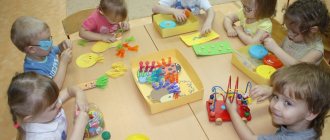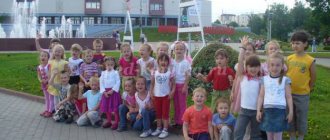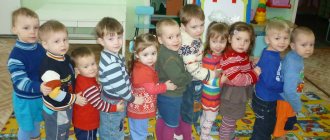How to choose a topic for self-education?
There are only two main criteria:
- requirement to study the topic from the outside (formulated in regulatory documents, in particular, in the Federal State Educational Standard for Preschool Education);
- the work of the teacher himself (lack of experience and knowledge to resolve a particular pedagogical situation).
Thus, before choosing a topic, you need to familiarize yourself with the regulatory framework for preschool education and analyze your own experience.
According to the Federal State Educational Standard, a preschool child develops in the following areas:
- social and communicative;
- educational;
- speech;
- artistic and aesthetic;
- physical.
What is certification like?
Let's consider both of its types - mandatory and voluntary.
The first, as already mentioned, must take place once every five years. Its purpose is to confirm that the teacher is suitable for his position. All employees who do not have categories and have no desire to receive them are required to pass it.
Those holding a position for no more than 2 years, mothers on maternity leave and pregnant women are exempt from certification. The deadline for them will come no earlier than two years after the end of the leave granted to care for the child.
The employer submits the teacher for certification. If a teacher holds several positions in one institution at once, and is not certified in any of them, then it is possible for all of them at once.
If he works part-time in different places, then each employer is authorized to send him for certification.
Approximate topics of self-education for a preschool teacher according to the Federal State Educational Standard (2017 and later)
In accordance with the identified areas, topics on self-education for kindergarten teachers according to the Federal State Educational Standard can be as follows:
- Methods and means of amplification of preschool child development.
- Pedagogical diagnostics in a preschool institution.
- Individual approach in preschool education.
- Means and methods of developing safe life skills in preschoolers.
- Development of emotional intelligence in preschoolers.
- Guiding the play activities of preschool children.
- Cultivating kindness in preschoolers.
- Raising responsiveness in preschool children.
- Fostering sense of purpose in preschool children.
- Cultivating honesty and truthfulness in preschoolers.
- Formation of ideas about the small homeland among preschoolers.
- Development of creative abilities in preschool children.
- Formation of prerequisites for educational activities in children of senior preschool age.
- Cultivating curiosity in preschoolers (in classes, in communication, play, work).
- Formation in preschoolers of ideas about the signs, qualities and properties of objects in the surrounding world.
- Familiarization of preschoolers with the biocenosis of a forest (meadow, pond).
- Formation of ideas about space in preschoolers.
- Formation of ideas about inanimate nature in preschool children (natural phenomena, seasons, change of day and night).
- Formation in preschoolers of ideas about the shape, size, spatial relationships of objects.
- Formation of the concept of number in preschoolers.
- Development of forms of communication in preschoolers.
- Development of coherent speech in preschool children (in communication, play).
- Teaching children 4-7 years old basic analysis of a literary work.
- Teaching preschoolers to retell literary works.
- Teaching preschoolers to read poems expressively.
- Creative storytelling in kindergarten.
- Literacy training in preschool educational institutions.
- Non-traditional techniques of visual activity in kindergarten.
- Health-saving technologies in preschool education.
- Formation of cultural and hygienic skills in children of early and preschool age.
- Formation of self-service skills in preschoolers.
- Creating psychological comfort in a preschool group.
- Computer technologies in preschool education.
- Continuity of preschool and primary education.
- Psychological and pedagogical assistance in the family in the education and development of preschool children.
In 2016, changes and additions were made to the Federal State Educational Standard, in particular, on the education of children with disabilities. In this regard, one of the self-education topics for kindergarten teachers according to the Federal State Educational Standard 2022 could be:
- "Inclusive education in preschool settings."
In addition to topics in a specific area, you can choose a topic related to the work of a preschool institution as a whole:
- Planning work in a preschool institution according to the Federal State Educational Standard.
- Developing subject-spatial environment in preschool educational institutions.
- Development of partial preschool education programs.
- Innovative forms of working with parents of preschool children.
The list of topics on self-education for kindergarten teachers according to the Federal State Educational Standard 2022 may include the following topics:
- Variability of preschool education services at the present stage.
- Experimental activities in preschool educational institutions.
- Quality of preschool education: evaluation criteria.
- Social relations in preschool education.
What happened?
As you know, there is mandatory and voluntary certification. The first task is to confirm the teacher’s suitability for the position he occupies. The second occurs when it comes to raising the qualification category.
According to the rules in force earlier, if a teacher wanted to increase his salary, he, on his own initiative, submitted an application requesting assignment to one of the categories - highest, first or second. This was done by the management of the child care institution or the educational management body.
Later, the second category was canceled as such. Certification began to be managed by educational authorities at the level of the constituent entity of the Russian Federation. The main thing: this procedure is now mandatory. Once every five years, absolutely all teachers, regardless of their work experience, regardless of their own desire, must take it to confirm their suitability for the position they occupy.
How to work by topic
Work on each of the listed topics begins with an analysis of the literature (an approximate list of sources is given below). When reading books, the teacher identifies the main thoughts, ideas, and judgments of the authors. So, taking up the topic of using didactic games to develop safe life skills in children, the teacher:
- draws attention to the peculiarities of organizing didactic games in different age groups;
- content of work on life safety in preschool educational institutions.
Then the teacher thinks through or also takes from books potentially dangerous situations that need to be avoided, and based on the knowledge gained, compiles a card index of games. He develops games himself or takes them from sources. Systematized materials are tested in practice.
Types of projects
By type of activity, all projects can be divided into the following:
- Creative and research, the fruits of which are stands, showcases, wall newspapers, posters and so on. The teacher’s design and research activities in this case are aimed at developing children’s ability to experiment.
- Information projects are aimed at collecting and analyzing information, transforming it into material objects such as stands or various crafts.
- The use of projects using role-playing game themes allows you to solve the problem using different characters.
The most experienced teachers in this area can give a master class on project activities for educators, which will clearly demonstrate the effectiveness and significance of the method used.
If you're unlucky
In the latter case, the employer has the legal right to terminate the contract with the employee, but is not obliged to do so. He may suggest that he take advanced training courses and then re-pass the certification.
Instead of dismissal, an employee can and should be transferred, with his consent, to another position (lower), if there is a vacancy. They also do not have the right to deprive a temporarily disabled person of work, a pregnant woman, a woman with children under 3 years of age, or a single mother with a child under 14 years of age or a disabled child.
Voluntary certification
It is organized to assign the first (or highest) category at the initiative of the employee and on the basis of his application. Its purpose is to establish compliance of the teacher’s qualifications with the requirements of the declared category.
Employees who do not yet have any have the right to apply for the first one. Or those whose validity period for the previously received 1st category is coming to an end. For higher education - those who received their first two or more years ago, as well as those wishing to renew their existing one.
An application for teacher certification is submitted by the teacher independently at any time. To ensure that the previous application does not expire during the period of its consideration, it is recommended to submit it in advance - 3 months in advance.
Appealing the results of certification
The right to such an appeal is documented. This is done by submitting an application to the labor dispute commission or even to the court, and in the latter case it is important to do this within three months from the date of certification.
But in practice, such situations happen extremely rarely. As a rule, teachers submit documents for certification being thoroughly prepared - having thoroughly studied all the necessary requirements, preparing a competent and worthy portfolio and being completely confident in their own abilities.
How does it go?
Certification of the senior teacher, educator, educational psychologist and other employees is carried out in the prescribed manner. During this process, to confirm their qualifications, subjects are subjected to written examinations or computer testing. Their goal is to identify the level of proficiency in professional methods of modern teaching, to confirm the valuable experience of working as a preschool teacher and the level of their own competence.
The decision made by the commission is drawn up in the form of a protocol and entered into the employee’s certification sheet. The latter is kept in the teacher’s personal file.
If the certification is completed successfully, the commission’s verdict is “suitable for the position held.” Otherwise - “does not correspond”.
Certification for the highest category of teacher: requirements are growing
Requires the presence of the first qualification category, successful application in practice of new educational methods and technologies, demonstration of students' mastery of practiced programs. The results must be stable, and the dynamics of success indicators must be above the average level of the subject of the Russian Federation.
The teacher will have to demonstrate personal contribution to improving educational and educational methods, improving the quality of education. And also - mastery of new technologies and dissemination of personal professional experience.
How are documents submitted?
The application for a teacher is drawn up by the employer according to the established template. The document contains all the necessary certificates for the certification of a teacher, a detailed comprehensive assessment of the employee’s professional skills and the quality of his work in the position. In addition, there is information about all advanced training courses completed and the results of past certifications.
A month before the test, the teacher is introduced to the performance under signature. The documents are submitted by the employer to the certification commission of the relevant constituent entity of the Russian Federation, where its date, time and place are set. The duration of its completion should not be more than two months.





